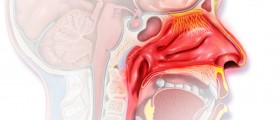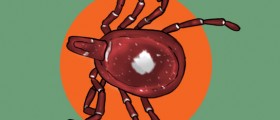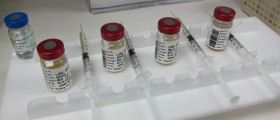
Sore Throat and Allergies
Sore throat is also very common problem and it can be caused either by some bacteria or viruses. Bacterial infections of the throat are usually caused by bacterium Streptococcus and it can affect the tonsils, larynx or pharynx, causing inflammation and itching. In some cases bacterial infections may also be the cause of ear infections and ear itching.
Viral infections we usually get from other people, being near them while they cough, or sneeze or simply sharing the drink with them. Common cold and flu are common viral infections and they are often known to provoke itching of the throat and the ears.
Allergic reactions can cause great discomfort and cause itchiness in both your ear and your throat. You can be allergic to different things, like pollen, dust mites, food, pet dander or even to some medications. Your body doesn’t know these substances are harmless but consider them threatening and thus reacts to defend itself. Doctors and scientists still can’t tell why this is happening and why they are allergic to something. They can relieve the problem, easing some of the symptoms patients have been experiencing, such as: sneezing, headaches, tiredness, congestion, skin reactions and itchiness of the eyes, nose and throat.
Treat Itching Ears and Throat
Sore throat and allergies can be root causes of the itchiness you are felling. To know how to treat the problem you must be properly diagnosed and then start the treatment.
Sore throat is normally healed after several days of rest, increased intake of fluids and healthy diet. You can drink lemon tea, gargle some salt water and suck Throat lozenges, for people often say these were helpful. Viral infections are usually not treated with drugs unless the condition is very serious. Bacterial infections of the throat and ears, on the other hand need antibiotic treatment, usually with penicillin, amoxicillin, clindamycin or clarithromycin.
Allergic reactions are commonly treated with antihistamines such as Benadryl (diphenhydramine) or Chlor trimeton (chlorpheniramine). Some suggest using green tea or remedies made of chamomile, stinging nettle or licorice root to ease allergies. The best way to avoid allergic reactions is to avoid the trigger of such reaction. Don’t eat something if you are allergic or consult your doctor what to do if the prescribed medication is causing this problem. For some allergy patients, there are allergy shots which can reduce some of the symptoms. Nasal sprays with Cromolyn sodium are known to efficiently work against itchiness caused by allergy.
- www.nhs.uk/conditions/ear-infections/
- www.nhs.uk/conditions/food-allergy/
- Photo courtesy of Corrie Barklimore by Flickr: www.flickr.com/photos/corrieb/1300222849/

















Your thoughts on this
Loading...